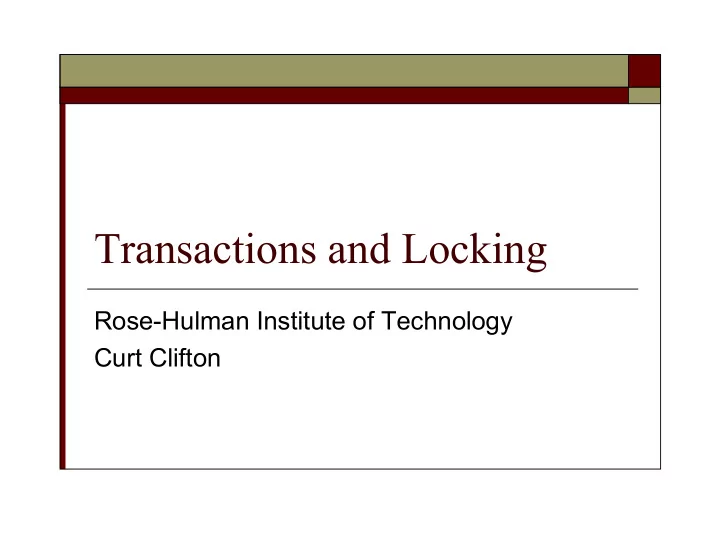

Transactions and Locking Rose-Hulman Institute of Technology Curt Clifton
Outline ACID Transactions COMMIT and ROLLBACK Managing Transactions Locks
The Setting Database systems are normally being accessed by many users or processes at the same time Operating Systems also deal with concurrent access OSs allow two people to edit a document at the same time. If both write, one’s changes get lost . DB can and must do better
Example Mom and Dad each deposit $100 from different ATMs into your account at about the same time
ACID Transactions Atomic All or nothing Consistent Constraints preserved Isolated (Apparently) one user at a time Durable Crashes can’t violate the other properties
Transactions in SQL SQL supports transactions Generic query interface Each statement issued is a transaction by itself Programming interfaces A transaction begins with first SQL statement Ends with the procedure end (or an explicit end)
Ending Transactions COMMIT completes a transaction Modifications are now permanent in the database ROLLBACK ends transaction by aborting No effects on the database! Failures (e.g., division by 0) also cause ROLLBACK
Another Example Assume the usual Sells(rest,soda,price) relation Suppose that Majnoo’s Rest sells only Coke for $1.50 and Salaam Cola for $1.75. Laila is querying Sells for the highest and lowest price Majnoo charges. Majnoo decides to stop selling Coke and Salaam Cola to starting only Juice at $2.00
Laila’s Program Laila executes the following two SQL statements Call this one “max”: SELECT MAX(price) FROM Sells WHERE rest = 'Majnoo''s Rest'; “min”: SELECT MIN(price) FROM Sells WHERE rest = 'Majnoo''s Rest';
Majnoo’s Program At about the same time, Majnoo executes the following SQL statements “del” DELETE FROM Sells WHERE rest = 'Majnoo''s Rest'; “ins” INSERT INTO Sells VALUES('Majnoo''s Rest', 'Juice', 2.00);
Interleaving of Statements Constraints: max must come before min del must come before ins No other constraints on the order of the statements
Example: Strange Interleaving Suppose the steps execute in the order: max del ins min What answers does Laila see?
Fixing the Problem: Transactions If we group Laila’s statements max min into one transaction: Cannot see this inconsistency Will see Majnoo’s prices at some fixed time
Problem: Undoing Changes Majnoo executes del ins Changes his mind Reverses the changes, say by del' , ins' Suppose the order is: del ins max min del' ins' What does Laila see?
Solution If Majnoo executes del ins as a transaction, its effect cannot be seen by others until the transaction executes COMMIT Instead of del' ins' he uses ROLLBACK instead Effects of transaction can never be seen.
Transactions and Locks in SQL Server Transactions Ensure That Multiple Data Modifications Are Processed Together Locks Prevent Update Conflicts Transactions are serializable Locking is automatic Locks allow concurrent use of data Concurrency Control
Managing Transactions (outline) Transaction Recovery and Checkpoints Considerations for Using Transactions Setting the Implicit Transactions Option Restrictions on User-defined Transactions
Transaction Recovery, Checkpoints Transaction Log ZOT! Recovery Needed? NONE INSERT … Time (and place in log) DELETE … UPDATE … … Recovery Needed? ROLL FORWARD INSERT … Recovery Needed? ROLL BACK DELETE … COMMIT UPDATE … … CHECKPOINT INSERT … Recovery Needed? ROLL FORWARD DELETE … UPDATE … Transaction Log … INSERT … Recovery Needed? ROLL BACK DELETE … COMMIT UPDATE … … INSERT … DELETE … Database UPDATE … … COMMIT CRASH!!!
Considerations when Using Transactions Transaction Guidelines Keep transactions as small as possible Use caution with certain Transact-SQL statements Avoid transactions that require user interaction Issues in Nesting Transactions Allowed, but not recommended Use @@trancount to determine nesting level
Implicit Transactions Automatically Starts a Transaction When You Execute Certain Statements Nested Transactions Are Not Allowed Transaction Must Be Explicitly Completed with COMMIT or ROLLBACK By Default, Setting Is Off SET IMPLICIT_TRANSACTIONS ON
Restrictions on Transactions Certain Statements May Not Be Included in a Transaction: ALTER DATABASE BACKUP LOG CREATE DATABASE DROP DATABASE RECONFIGURE RESTORE DATABASE RESTORE LOG UPDATE STATISTICS
How much ACID have we done? Explicit transactions support Atomicity Automatic rollback on errors supports Consistency Transaction log supports Durability
Locks Support Isolation
Lockable Resources Item Description Item Description RID Row identifier Key Row lock within an index Page Data page or index page Extent Group of pages Table Entire table Database Entire database
Types of Locks Basic Locks Shared Exclusive Special Situation Locks Intent Update Schema Bulk update
Lock Compatibility Locks May or May Not Be Compatible with Other Locks Examples Shared locks are compatible with all locks except exclusive Exclusive locks are not compatible with any other locks Update locks are compatible only with shared locks
Dynamic Locking Cost Row Page Table Granularity Locking Cost Concurrency Cost
Week Eight Deliverables Sample Reports See rubric on Angel First draft due by Friday night (50 points) New versions due week nine (100 points) Meet with me during lab time today to agree on reports!
Recommend
More recommend